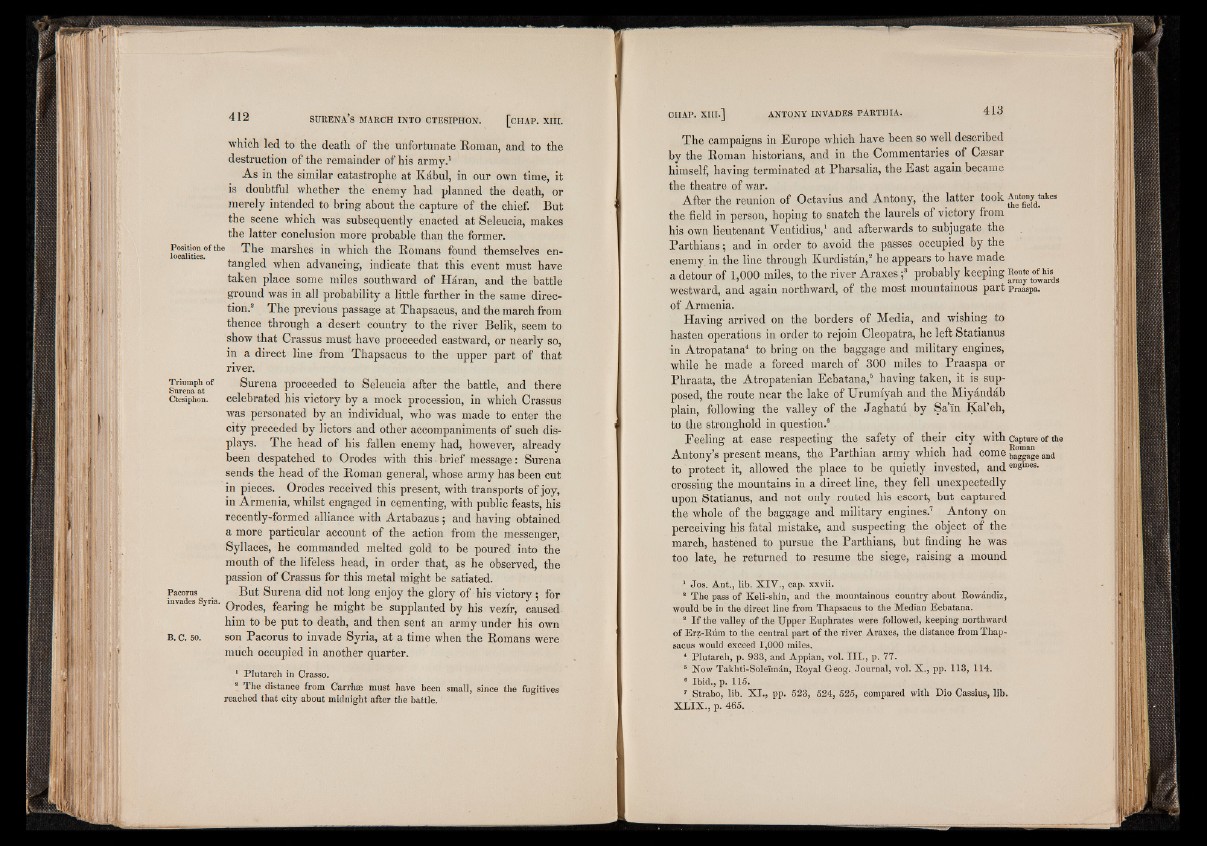
•which led to the death of the unfortunate Eoman, and to the
destruction of the remainder of his army.1
As in the similar catastrophe at Kabul, in our own time, it
is doubtful whether the enemy had planned the death, or
merely intended to bring about the capture of the chief. But
the scene which was subsequently enacted at Seleucia, makes
the latter conclusion more probable than the former.
Position of the The marshes in which the Romans found themselves en- localities. , j tangled when advancing, indicate that this event must have
taken place some miles southward of Haran, and the battle
ground was in all probability a little further in the same direction.
2 The previous passage at Thapsacus, and the march from
thence through a desert country to the river Belik, seem to
show that Crassus must have proceeded eastward, or nearly so,
in a direct line from Thapsacus to the upper part of that
river.
Triumph of Surena proceeded to Seleucia after the battle, and there
Surena at i k j l • • . . .
ctesiphon. celebrated his victory by a mock procession, in which Crassus
was personated by an individual, who was made to enter the
city preceded by lictors and other accompaniments of such displays.
The head of his fallen enemy had, however, already
been despatched to Orodes with this brief message: Surena
sends the head of the Roman general, whose army has been cut
in pieces. Orodes received this present, with transports of joy,
in Armenia, whilst engaged in cementing, with public feasts, his
recently-formed alliance with Artabazus; and having obtained
a more particular account of the action from the messenger,
Syllaces, he commanded melted gold to be poured into the
mouth of the lifeless head, in order that, as he observed, the
passion of Crassus for this metal might be satiated.
Pacorus But Surena did not long enjoy the glory of his victory ; for
invades Syria. Qr0C|eS) fearjng he might be supplanted by his vezir, caused
him to be put to death, and then sent an army under his own
B.c. 50. son Pacorus to invade Syria, at a time when the Romans were
much occupied in another quarter.
1 Plutarch in Crasso.
8 The distance from Carrh® must have been small, since the fugitives
reached that city about midnight after the battle.
The campaigns in Europe which have been so well described
by the Roman historians, and in the Commentaries of Caesar
himself, having terminated at Pharsalia, the East again became
the theatre of war.
After the reunion of Octavius and Antony, the latter took kes
the field in person, hoping to snatch the laurels of victory from
his own lieutenant Ventidius,1 and afterwards to subjugate the
Parthians; and in order to avoid the passes occupied by the
enemy, in the line through Kurdistan," he appears to have made
a detour of 1,000 miles, to the river Araxes ;3 probably keeping j j j
westward, and again northward, of the most mountainous part praaspa.
of Armenia.
Having arrived on the borders of Media, and wishing to
hasten operations in order to rejoin Cleopatra, he left Statianus
in Atropatana4 to bring on the baggage and military engines,
while he made a forced march of 300 miles to Praaspa or
Phraata, the Atropatenian Ecbatana,5 having taken, it is supposed,
the route near the lake of Urumiyah and the Miyandab
plain, following the valley of the Jaghatu by Sa’in Kal’eh,
to the stronghold in question.6
Feeling at ease respecting the safety of their city with capture of the
Antony’s present means, the Parthian army which had come baggage and
to protect it, allowed the place to be quietly invested, andensmes-
crossing the mountains in a direct line, they fell unexpectedly
upon Statianus, and not only routed his escort, but captured
the whole of the baggage and military engines.7 Antony on
perceiving his fatal mistake, and suspecting the object of the
march, hastened to pursue the Parthians, but finding he was
too late, he returned to resume the siege, raising a mound
1 Jos. Ant., lib. X IV ., cap. xxvii.
8 The pass of Keli-shin, and the mountainous country about Rowandiz,
would be in the direct line from Thapsacus to the Median Ecbatana.
8 I f the valley of the Upper Euphrates were followed, keeping northward
of E rz-Rum to the central part of the river Araxes, the distance from Thapsacus
would exceed 1,000 miles.
* Plutarch, p. 933, and Appian, vol. I I I ., p. 77.
5 Now Takhti-Solelmdn, Royal Geog. Journal, vol. X., pp. 113, 114.
8 Ibid., p. 115.
7 Strabo, lib. X I ., pp. 523, 524, 525, compared with Dio Cassius, lib.
X L IX ., p. 465.